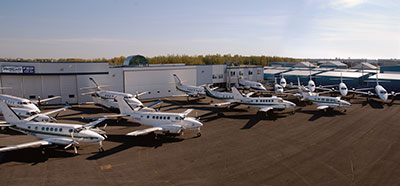
Features
Operations
At the gate: Taking a different approach
Pascan Aviation, which bills itself as “the largest independent airline in Quebec,” continues to add new destinations and new aircraft.
November 14, 2013 By Brian Dunn
Pascan Aviation, which bills itself as “the largest independent airline in Quebec,” continues to add new destinations and new aircraft. On Oct. 10, the St. Hubert-based carrier added Monday-Friday service between St. John’s and Moncton and a Friday and Sunday flight between Moncton and Quebec City with a connection to Îles-de-la-Madeleine.
 |
|
| What makes Pascan different is its spider web approach to flying versus the hub-and-spoke model most major carriers use. PHOTO: Pascan Aviation
|
Founded in 1999 by career pilot Serge Charron with a single leased Pilatus PC-12, Pascan has built itself into a powerful regional airline that connects several remote regions of Quebec. It serves 20 municipalities from as far north as Wabush/Fermont to Gatineau/Ottawa in the west and St. John’s to the east and is the only scheduled airline that flies out of Mirabel.
The company’s fleet consists of three ATR 42 turboprops, 13 BAe Jetstream 32s, seven Beechcraft B100 King Airs, four Pilatus PC-12/45s and two Piper PA-31 Navajo cargo aircraft. It employs about 300 people, including 80 pilots.
To expand its operations, last year it bought the assets of Exact Air with operations in Baie-Comeau, Mont-Joli, Sept-Îles and Havre-Saint-Pierre, which included three buildings, three aircraft and other equipment. The $5-million transaction also included the passenger and cargo routes between Havre-Saint-Pierre, Sept-Îles and Port-Menier on Anticosti Island. The deal integrated the routes into Pascan’s expanding network and gives outdoorsmen easier access to Anticosti.
The addition of the three aircraft allows Pascan to offer direct service to some smaller destinations such as Montreal-Baie-Comeau and Quebec-Rouyn-Noranda. The 15-odd employees of Exact Air were absorbed by Pascan and a new schedule to Port-Menier was created.
“We were approached by Moncton because there was no direct service between Moncton and St. John’s,” says Brenda Libby, senior director business development and marketing at Pascan. “There was a competing airline, but it didn’t offer direct (non-stop) service.
“It costs between $250,000 and $4 million to develop a new route, so it had to make economic sense to us. We determined that almost every flight coming into Moncton was full, so we saw a good business opportunity.”
Business has grown about 20 per cent a year over the past five years and it will continue to grow with the addition of more routes and new aircraft. To help grow the company, Charron took on Denis Charest in 2003 as a 50/50 partner. Charest is the president and chief executive officer of Boucherville, Que.-based Spectra Premium, a worldwide manufacturer of replacement car parts.
“We’re selling the King Airs and adding more ATRs,” says Libby, a former vice-president of sales and marketing at Montreal’s Starlink Aviation. “We like the aircraft because it can land on gravel and offers superior cold weather performance. It also offers a wide body, making it easier to load cargo through two cargo doors, which is important considering some of the destinations we serve. It’s also a quiet aircraft for a turboprop and the interior gives passengers a lot of headroom and legroom.”
The next step is to extend the St. John’s-Moncton route into Quebec, to either St. Hubert or Mirabel, and the purchase of two 72-seat ATR 72s is planned for 2014. The future also includes jet service to international destinations.
There have been plenty of regional airlines in Quebec that have come and gone over the years, including Quebecair, Quebecair Express, Nordair and Intair to name a few. Pascan doesn’t expect to be added to that list anytime soon, if at all. The executive team maintains it has found a winning formula, despite facing competition on most of its routes.
“We have competition on all our routes, except for Alma, Roberval and Bonaventure,” says Pascan general manager Julian Roberts, who joined the company eight years ago. Like his boss, he has been in the aviation business a long time, starting at age 16 on the ramp and moving up to maintenance and reservations and everything else in between for other carriers.
What makes Pascan different is its spider web approach to flying versus the hub-and-spoke model most major carriers use.
“We have a niche market,” Roberts says. “For example, we have a direct flight from Mont-Joli to Sept-Îles which is a 35-minute flight across the St. Lawrence River. If you took Air Canada Jazz, you would have to fly from Mont-Joli all the way down to Montreal and then back up to Sept-Îles.
“We’re looking outside the box. Some of the places we serve are too small for a CRJ or Embraer aircraft, but we feel we can be successful with a 42-seater or less. We concentrate on smaller markets which are poorly served or not served at all.”
Looking outside the box and capitalizing on opportunities continues to give Pascan Aviation a distinct advantage in the competitive Quebec commercial landscape.
Brian Dunn is a Wings writer and columnist.